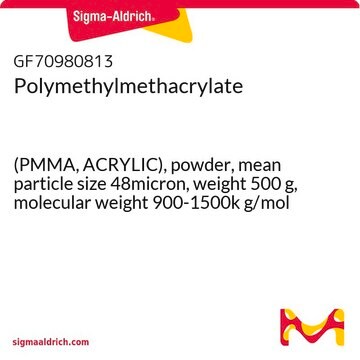445746
Poly(methyl methacrylate)
average Mw ~350,000 by GPC
Sinônimo(s):
PMMA, Poly(methacrylic acid methyl ester)
About This Item
Produtos recomendados
forma
powder
temperatura de autoignição
580 °F
peso molecular
average Mw ~350,000 by GPC
viscosidade reduzida
150-160 cm3/g(20 °C)(lit.)
número de acidez
<1 mg KOH/g
temperatura de transição
Tg (DSC) 105 °C (midpoint)
solubilidade
alcohols and aliphatic hydrocarbons: insoluble
esters, ketones, aromatics and glycol ethers: soluble
densidade
1.17 g/mL at 25 °C
InChI
1S/C5H9O2/c1-4(2)5(6)7-3/h1-3H3
chave InChI
PMAMJWJDBDSDHV-UHFFFAOYSA-N
Procurando produtos similares? Visita Guia de comparação de produtos
Categorias relacionadas
Descrição geral
Aplicação
Características e benefícios
Código de classe de armazenamento
11 - Combustible Solids
Classe de risco de água (WGK)
nwg
Equipamento de proteção individual
Eyeshields, Gloves, type N95 (US)
Certificados de análise (COA)
Busque Certificados de análise (COA) digitando o Número do Lote do produto. Os números de lote e remessa podem ser encontrados no rótulo de um produto após a palavra “Lot” ou “Batch”.
Já possui este produto?
Encontre a documentação dos produtos que você adquiriu recentemente na biblioteca de documentos.
Os clientes também visualizaram
Artigos
Professor Aran discusses engineering graphene-based materials through careful functionalization, enabling diverse applications.
Self-healing soft electronic materials enable autonomous repair, reducing waste and costs in electronic devices.
Fluorescence quenching microscopy visualizes 2D materials like graphene and MoS2 rapidly, inexpensively, and with high fidelity.
Nossa equipe de cientistas tem experiência em todas as áreas de pesquisa, incluindo Life Sciences, ciência de materiais, síntese química, cromatografia, química analítica e muitas outras.
Entre em contato com a assistência técnica






